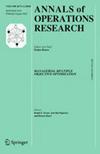相对风险规避必须接近 1
IF 4.4
3区 管理学
Q1 OPERATIONS RESEARCH & MANAGEMENT SCIENCE
引用次数: 0
摘要
任何从下往上或从上往下都不受限制的效用函数都意味着悖论行为。然而,如果这些悖论涉及的财富水平在现实中毫无意义,那么它们就可以被视为无关紧要。利用现实世界中的财富限制条件可以发现,相对风险规避范围在 0.75-1.15 之外的 CRRA 效用会产生悖论性选择,而这种选择即使有,也是极少数人会做出的。因此,相对风险规避必须接近 1,即与对数偏好相对应的值。这些结果为长期以来关于几何平均标准和长期股票论证的争论带来了新的启示。本文章由计算机程序翻译,如有差异,请以英文原文为准。

Relative risk aversion must be close to 1
Any utility function that is unbounded either from below or from above implies paradoxical behavior. However, these paradoxes may be regarded as irrelevant if they involve wealth levels that are realistically meaningless. Employing real-world constraints on wealth reveals that CRRA utility with relative risk aversion outside of the range 0.75–1.15 yields paradoxical choices that very few individuals, if any, would ever make. Thus, relative risk aversion must be close to 1, the value corresponding to log preferences. These results shed new light on the longstanding debate about the geometric-mean criterion and the argument of stocks for the long-run.
求助全文
通过发布文献求助,成功后即可免费获取论文全文。
去求助
来源期刊

Annals of Operations Research
管理科学-运筹学与管理科学
CiteScore
7.90
自引率
16.70%
发文量
596
审稿时长
8.4 months
期刊介绍:
The Annals of Operations Research publishes peer-reviewed original articles dealing with key aspects of operations research, including theory, practice, and computation. The journal publishes full-length research articles, short notes, expositions and surveys, reports on computational studies, and case studies that present new and innovative practical applications.
In addition to regular issues, the journal publishes periodic special volumes that focus on defined fields of operations research, ranging from the highly theoretical to the algorithmic and the applied. These volumes have one or more Guest Editors who are responsible for collecting the papers and overseeing the refereeing process.
 求助内容:
求助内容: 应助结果提醒方式:
应助结果提醒方式:


